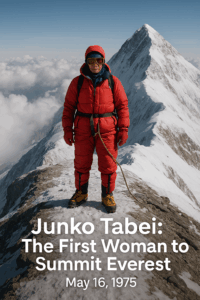I. Introduction: The Day the Summit Was Rewritten
On May 16, 1975, high above the clouds in the unforgiving terrain of the Himalayas, a Japanese woman named Junko Tabei became the first woman in history to reach the summit of Mount Everest. Her name was etched into the record books that day, but her legacy was far more profound than a title. She represented courage over conformity, passion over limitation, and resilience over the many voices that told her she didn’t belong.
The story of Junko Tabei is not merely a historical event—it is a mirror reflecting back to us the dormant strength we all carry. It is a blueprint for the individual who wants more out of life but feels hemmed in by boundaries—whether social, professional, or internal. As we revisit the remarkable significance of this moment, we can uncover timeless life strategies hidden within the snow-packed paths Tabei forged.
This blog will take you back to that monumental day, dive into the backstory of Tabei’s climb, and, most importantly, reveal how this seemingly distant historical moment offers powerful lessons for modern life.
II. The Woman Behind the Summit
Junko Tabei was born in 1939 in a small town in Fukushima, Japan. By all societal standards of her time, she was expected to grow up, marry, and dedicate herself to her household. But Junko wasn’t interested in fitting into the prewritten scripts of a woman’s role. Her heart belonged to the mountains. She fell in love with climbing during a class trip in elementary school and never looked back.
She pursued higher education in English and American literature, but her true passion remained climbing. In the male-dominated climbing world of the 1960s and 70s, she often faced subtle and overt discrimination. Climbing clubs rejected her, sponsors overlooked her, and male climbers frequently dismissed her ambitions. Some even told her that she was selfish for choosing to climb rather than staying at home to raise children.

Rather than capitulating, Junko forged her own path. In 1969, she founded the Ladies Climbing Club: Japan—the first all-women climbing group in the country. Their motto was bold and clear: “Let’s go on an overseas expedition by ourselves.” It wasn’t just about mountains anymore—it was about dignity, identity, and self-determination.
III. The Everest Expedition: A Journey of Grit
In 1975, Junko Tabei and her all-female Japanese climbing team set out to summit Everest. It was a daring expedition, not only due to the inherent dangers of the world’s highest peak, but because it was entirely woman-led in a time when that concept was nearly unthinkable.
Midway through the climb, disaster struck. An avalanche buried the group’s camp, and Junko herself was knocked unconscious. Many would have turned back. But not her. After being dug out and spending two days recovering, she insisted on continuing.
Twelve days later, she reached the summit.
She stood on top of the world. Not as someone chosen

by fate, but as someone who had chosen herself.
IV. Timeless Lessons from the Climb
The sheer audacity of Tabei’s climb isn’t just inspiring—it’s instructive. Her life offers us lessons that we can carry into our own careers, relationships, ambitions, and identities.
- Rewrite the Rules When the Rules Don’t Serve You
Tabei did not wait for permission. When male clubs excluded her, she created her own. She did not argue with gatekeepers—she bypassed them. Many of us wait for the world to validate our dreams before acting. But history, and Tabei’s life, teach us that you often need to go first.
In your own life, consider where you are still waiting—waiting for an invitation, for approval, for everything to feel “ready.” What would happen if you stopped waiting?
- Resilience Is Built Through Purpose, Not Just Strength
Junko Tabei was small in stature, physically unassuming, and not blessed with any superhuman traits. Her resilience came not from toughness, but from her clarity of purpose. She loved the mountains, and that love gave her strength.
Resilience isn’t gritting your teeth through suffering—it’s choosing a path so meaningful that giving up is no longer an option. When you find your “Everest,” even setbacks become part of the ascent.
- Fear is Natural—But It Isn’t a Stop Sign
The Everest climb was riddled with terrifying moments. Avalanches, altitude sickness, frostbite, and the very real possibility of death. Tabei felt fear, but she moved anyway.
In daily life, fear comes dressed as self-doubt, anxiety, or risk aversion. But fear doesn’t mean stop—it means something important is happening. Step forward anyway.
- Trailblazers Don’t Just Change Their Lives—They Change the World Around Them
Junko Tabei didn’t just climb Everest. She opened a door. After her achievement, more women began to attempt major climbs. Societies that had limited women began to loosen their grip, even slightly. Her single decision to climb echoed across decades.
Your own bold choices, though they may seem personal, are never isolated. They influence friends, family, communities. When you rise, others begin to believe they can rise too.
V. Your Personal Everest: Modern Application
How can you use Tabei’s story today? You don’t have to climb a literal mountain to learn from her. You only need to find your own “Everest”—a personal goal that seems just a little too big.
Career Climb
If you’re stuck in a job that undervalues you, or if you’re afraid to leap into a new venture, remember Tabei’s journey. She didn’t have a blueprint—she made one. Take that certification. Start the business. Apply for the leadership role. You don’t need to wait for consensus to act.
Mental Health and Inner Strength
Life’s internal struggles—depression, anxiety, loss—are just as steep as any mountain. Tabei’s story reminds us that setbacks do not mean the journey is over. You can take a break. You can regroup. And you can keep going.
Relationships and Identity
Being true to yourself—your values, identity, orientation, or passions—can feel like an uphill battle in a judgmental world. Tabei didn’t let external opinions define her. Neither should you.
You have every right to climb toward the life that feels most authentic, even if others don’t understand it.
- Legacy Isn’t in the Moment, It’s in the Momentum
Junko Tabei didn’t stop at Everest. She went on to climb the highest mountain on every continent, becoming the first woman to complete the Seven Summits. She dedicated her later life to environmental activism and mentoring young climbers. She lived, quite literally, above the limits others tried to place on her.
Her summit on May 16, 1975, wasn’t the end—it was the beginning.
What you choose to overcome today can become the momentum for your entire future. Every time you act despite fear, every time you pursue your own path, you shift the narrative of your life and possibly for others as well.
VII. Final Thought: From Summit to Self
As you go about your life on this seemingly ordinary May 16th, remember that on this day, decades ago, a woman did the impossible.
She defied stereotypes.
She pushed past pain.
She climbed because she believed she could.
You are not so different from Junko Tabei. Your mountain may not be Everest, but it is real. And it is yours.
So lace up.
Pack light.
And climb.
Because your summit is waiting.

